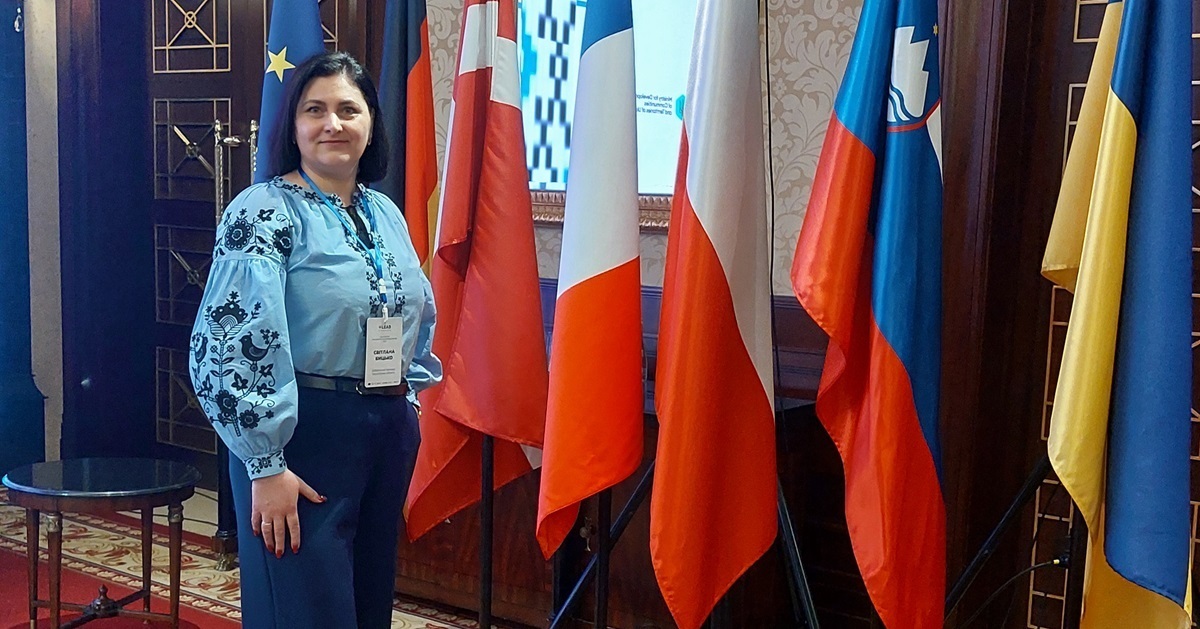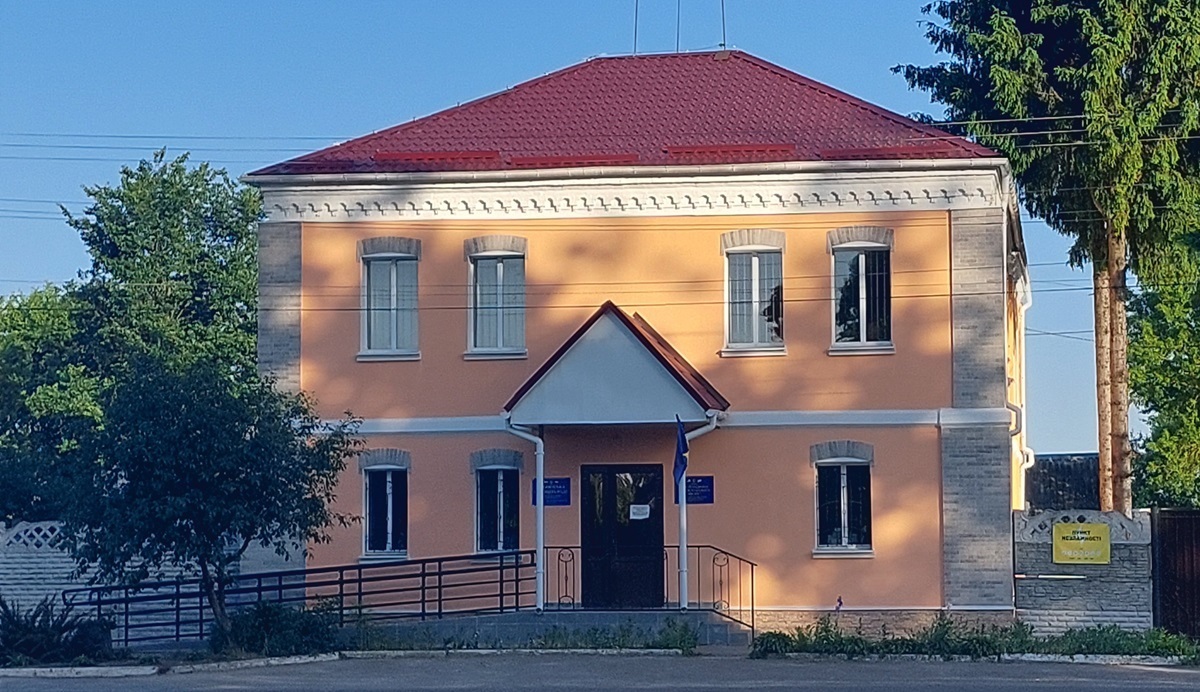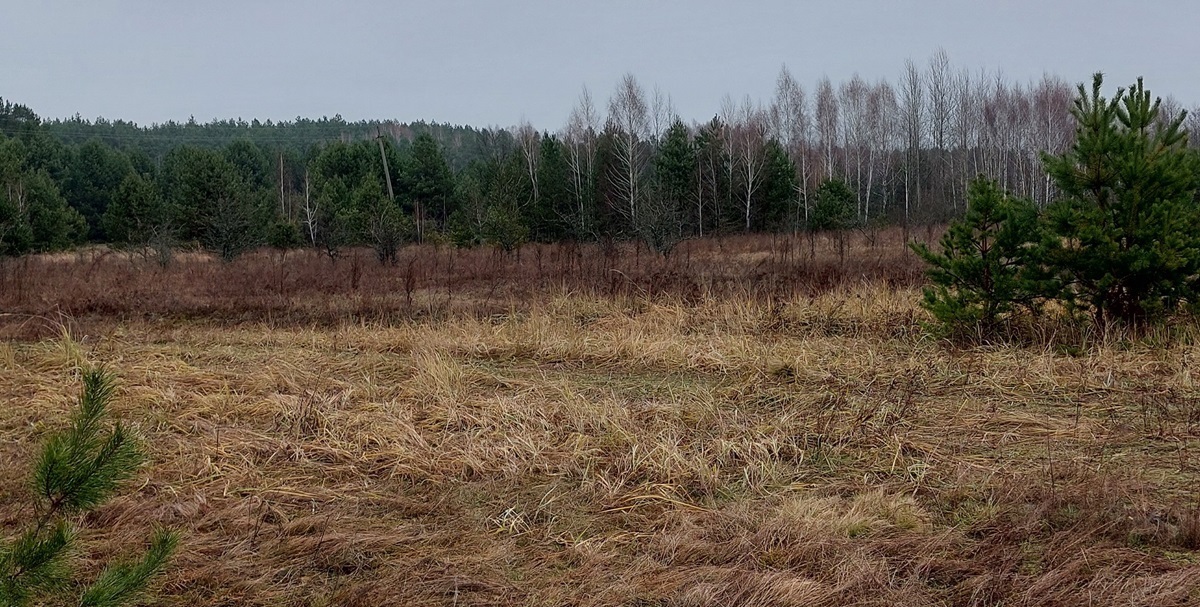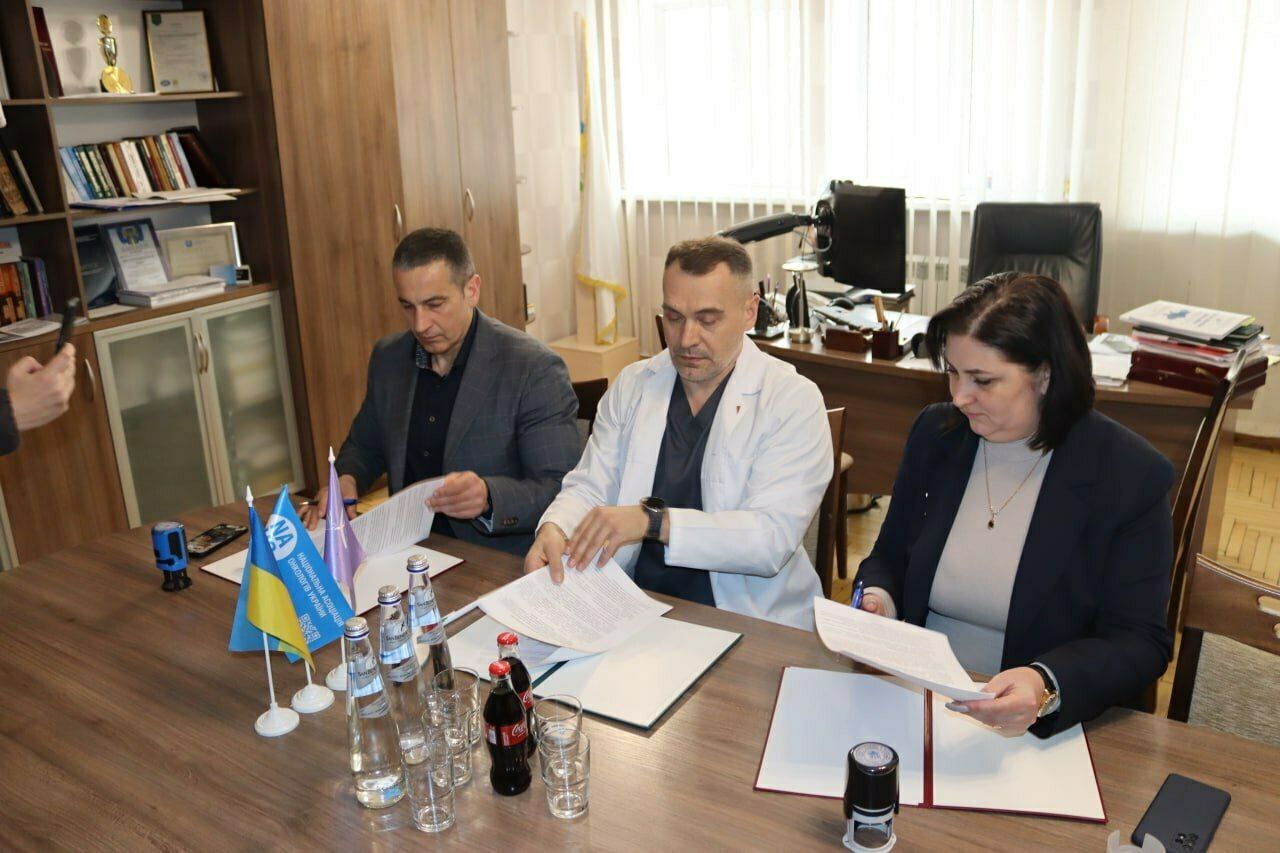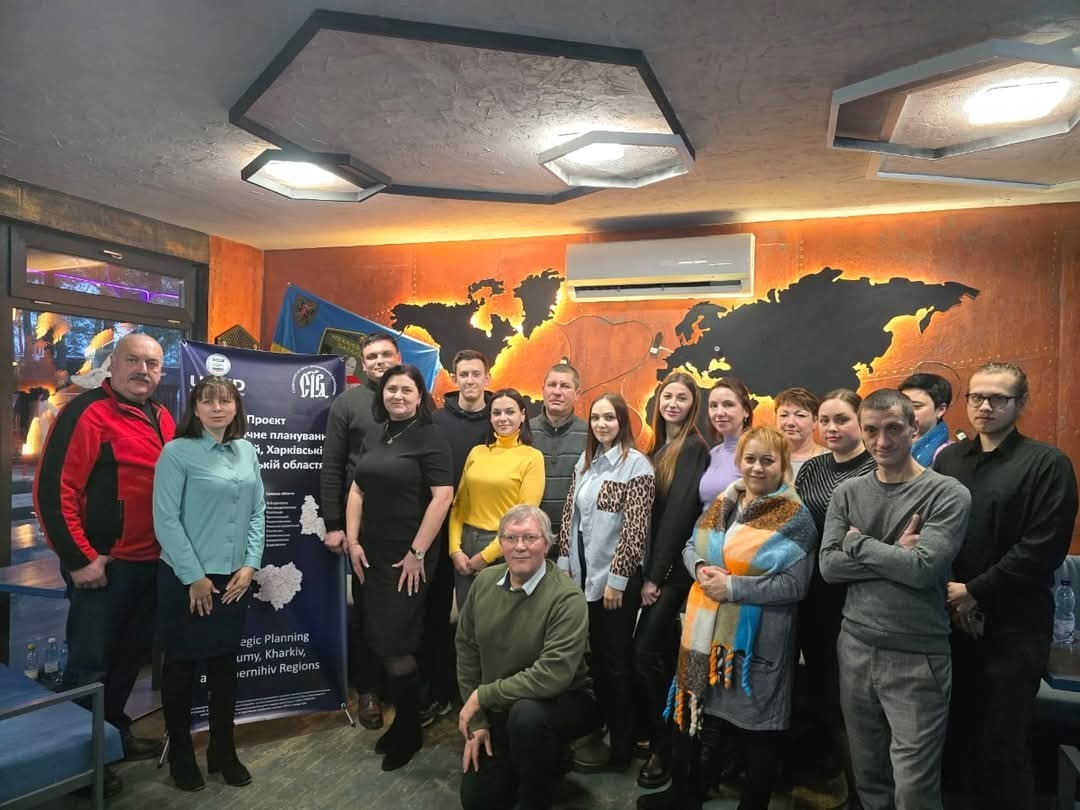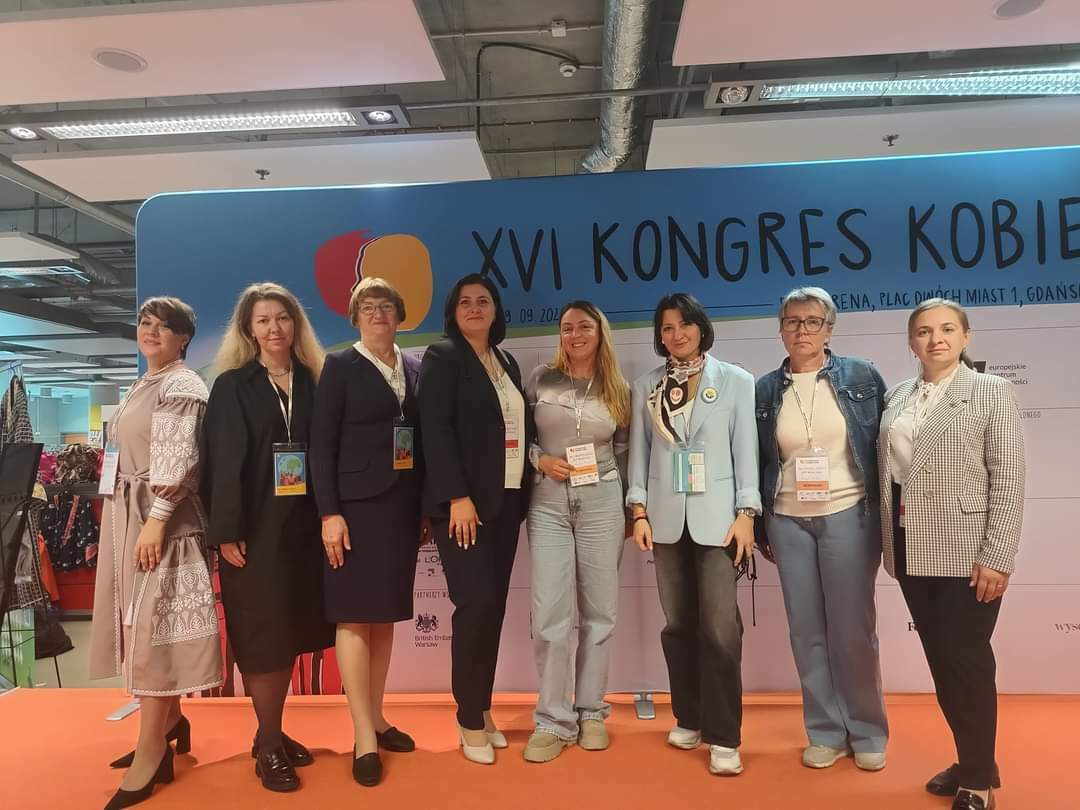‘Shoulder to Shoulder: Cohesive Communities’ as a chance for Dobrianka to survive and develop. Interview with the community leader
How can a community bordering Belarus survive when instead of trade routes it is mined and instead of stability there is constant uncertainty? Svitlana Bytsko, Head of the Dobrianka community, talks about life under the pressure of war, the search for new opportunities for development, plans to participate in the ‘Shoulder to Shoulder: Cohesive Communities’ National Project and the struggle for the future of her community.
By Dmytro Syniak
In the north-western part of the Chernihiv region, Dobrianka has long been a major logistics centre. The settlement was one of the largest on the so-called Kateryna Route, which was once used by many famous people, including Taras Shevchenko. As early as 1728, Dobrianka was granted the Magdeburg Law, and by the 19th century it had grown to become the home of 7,200 inhabitants. The development strategy of the Dobrianka community, which amalgamated in 2019, identified the Novi Yarylovychi checkpoint on the Belarusian-Ukrainian border as a powerful driver of economic life and a very important asset. Until 24 February 2022, the community benefited from the traffic passing through the checkpoint in both directions, day and night. Now it is closed, and the border is more like a fortress wall: heavily mined and surrounded by protective structures on the Ukrainian side. Svitlana Bytsko, Head of the Dobrianka community, told Decentralisation.gov.ua how the community is surviving in these conditions and what its plans are for the future.
Svitlana Bytsko, Head of the Dobrianka community in the Chernihiv region
Gardens of Victory
To what extent has the war affected the life of the community and, in particular, the activities of the settlement council?
On the one hand, we have nothing to complain about. We have been fortunate enough not to be shelled once during the entire full-scale war. And although russian drones do fly over our houses from time to time, they are always on their way elsewhere. Still, I would not say that the situation is calm. We are living on top of a ticking time bomb, and this has a huge impact on everything we do. We are right at the border: if the russian or Belarusian armies cross it, we may not have time to evacuate. Therefore, all our projects, including development projects, depend in one way or another on the situation in Belarus and russia. And the factor of an external threat that seems to be hanging in the air limits all the processes we are currently managing. This effect is reinforced by the hostile propaganda to which, unfortunately, our people continue to be susceptible. As soon as rumours about military exercises on the other side of the border start circulating in Telegram channels, our residents start talking about leaving the community. Many of them have friends and relatives all over the world, and some of them have settled down quite well. It is extremely difficult for the settlement council to work under such conditions.
What is the general mood of the local people like?
There is practically no pro-russian sentiment here. Those who could express such a sentiment left for Belarus on the first day of the full-scale invasion, when it was still possible. But the long period of uncertainty has exhausted people. However, as the Ukrainian Armed Forces achieve certain interim victories, public spirits rise sharply.
During the full-scale war, how has the composition of the population of the community changed?
Unfortunately, the population has been on the decline as a result of emigration, death and military service. Sadly, some soldiers from our community have already fallen. Many of these people were supposed to create families and raise children in our community. But this will not happen, because they were killed by russian invaders. Let me give you just one figure: in 2021 there were 280 pupils in our hub school, today there are only 197. In other words, no new children have come to take the place of the graduates. There are fewer and fewer people living in the area. The demographic problem has led to a shortage of staff. The administrative centre of the Dobrianka community was not a district centre before the amalgamation, so it had never had experienced staff. Now that there are fewer people in the community, we feel the lack of specialists very acutely.
Have internally displaced persons compensated for the loss of population?
Since 2014, about seventy IDPs have settled in the community. But most of them are our former residents of our community who had lived in eastern Ukraine. When the hostilities began there, they returned to their parents’ homes. A second wave of such returns occurred in 2022. There are hardly any complete strangers among the IDPs: people understand that the Belarusian border is not the best place to live. They are looking for at least a relative sense of security, which we cannot give them.
What is the community doing for IDPs?
As part of our ‘Care’ programme, we provide support to such people. Each of them has the right to receive between 5 and 7 thousand UAH per year. We also help IDPs find accommodation, help them negotiate with local people to rent houses, and other services. I am also grateful to the international foundation ‘Global Empowerment Mission (GEM)’ for the delivery of food parcels to all our residents every month. These food parcels are also given to the IDPs. I would also like to tell you about our ‘Gardens of Victory’ programme, which has been running for three years now, in which we plant potatoes with the help of the village council’s equipment and then collect them together, mainly by the employees of communal institutions. The settlement council organises machinery, warehouses and so on. We then distribute the harvest to families in need, as well as to schools, medical facilities and military units. Part of this ‘social’ harvest also goes to IDPs. Now we are talking about distributing planting material to those IDPs who want to start gardening, so that they can plant their own gardens of victory.
The Dobrianka Settlement Council and Administrative Services Centre are located in an administrative building in a settlement that has never been a district centre
Dobrianka community plants Gardens of Victory… and harvests good yields from them. Autumn 2024
About 46,000 inhabitants live on 45,000 hectares
How dangerous is it to be close to Belarus?
According to rumours reaching us from abroad, Lukashenko’s power is based only on Belarus’s categorical refusal to participate directly in the war. That is why we hope that Lukashenko, at least for the sake of his own security, will not be a direct participant in Putin’s adventure. So far, we have seen no aggressive action from Belarus.
Is the Dobrianka community involved in strengthening the border and supporting the Ukrainian Armed Forces?
Of course we are! We have four border starostas, so we have many points of contact. We have been on friendly terms with the State Border Guard Service for a long time and have always been there to lend a shoulder to each other in all matters. And now more than ever! Six military units that approached us last year received a subsidy from us of UAH 1.3 million. I believe we had no moral right to refuse. So far this year, we have already received more than a dozen such requests. And for such a large area – 45,200 hectares with 21 localities and 4,600 inhabitants – our budget is small. Last year, our budget was largely intergovernmental transfers: out of UAH 68.3 million, we had only about UAH 40 million in our own revenues.
Dobrianka residents weaving camouflage nets for the Ukrainian Armed Forces
How do you keep within budget?
Nearly 58% of our community’s territory is covered by forests, so we live mainly from the rent of forest enterprises. But it is precisely because of our dependence on them that the reform of the state forest companies at the end of last year was a blow to us. As a result, we lost a wood processing company that employed up to 50 of our local residents. Another heavy blow was the loss of the ‘military personal income tax’: there are many border guard units in our community, so we have lost several million hryvnias per year. We also lost about UAH 1 million in 2021 due to the re-registration of our customs office in Chernihiv. Mobilisation has also had a negative impact on the budget: a person who is mobilised to the State Border Guard Service often continues to live and work in our community, but our budget no longer receives personal income tax on their salary. Personally, I think it is wrong: if a person is here, with us, why should their personal income tax go to somewhere else? Our capacity is also affected by another feature of wartime: we are always forced to keep a reserve for a rainy day in the budget. We always try to start the new year with a surplus of funds so that, in the event of an emergency, we have a resource available to help the local population and the military.
What is the main use of local budget funds?
The fact that Dobrianka has never been a district centre has also affected the state of its infrastructure: we have never had administrative and other district-level facilities: large clubs, swimming pools, gyms, and other facilities. We had to build or create many structures from scratch. But thanks to the decentralisation reform, we have been given these opportunities and we have managed to get back on our feet in the end. We have systematically attracted and continue to attract funding from various sources to provide better services to our people. In particular, we are currently working on the reconstruction of the canteen at our hub school, where last year we built a high quality shelter that has allowed our children to resume learning in a mixed learning mode. This is very important to us, because some parents have moved to other communities only because there are sheltered schools there, and their children could go and learn there. Now we are trying to raise funds to build a shelter for our Sofia Rusova Oleshnia Lyceum. The lyceum is named after a woman who, by the way, was born and raised in the village of Oleshnia. She was a well-known Ukrainian educator, writer, translator and activist who took an active part in the political life of Ukraine in 1917-1921. The Lyceum educates only 70 children in grades 1-11, but we would not like to close it, also in view of this fact.
But if you unite the schools, the children will be the first to benefit. The community will also save a lot of money.
I do understand this. But again, the security factor comes into play: our administrative centre is practically on the border, and Oleshnia is 15 km away. In the event of provocations on the border with Belarus or other such situations, it will be much safer in Oleshnia than in Dobrianka. So, I think we should prepare for the possibility of placing our hub school there. IDPs are also taking this into account and want to settle in our villages further away from the border. Another reason why we refuse to close the lyceum is the roads. They are in a terrible condition. The community cannot repair them, and no government money is allocated for this. How to plan school trips without roads? There is another important aspect. In the vicinity of Oleshnia there are the unique Blue Lakes, which still attract a lot of tourists. So Oleshnia is a very promising region for us, which we will develop as soon as we have the opportunity.
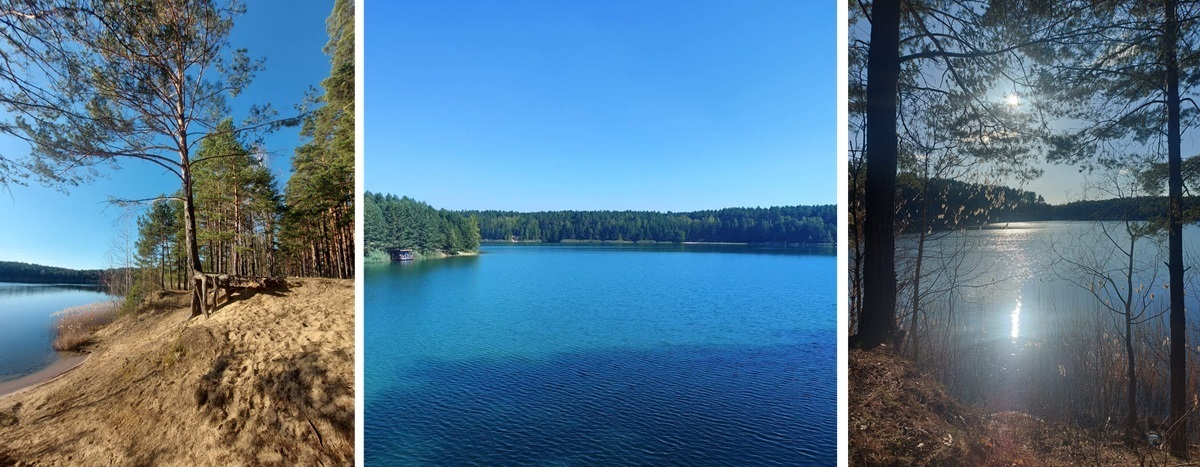
The famous Blue Lakes near Oleshnia are one of the most promising assets of the Dobrianka community
The cul-de-sac community
How has the border closure with Belarus affected your community?
It had a striking effect. Before the full-scale invasion, thousands of trucks carrying all kinds of goods passed through the Novi Yarylovychi checkpoint in both directions every day. Both Ukrainian and Belarusian tourists came to our Blue Lakes. Belarusians also used to go shopping to Chernihiv, where the goods were cheaper and of better quality than in their country. Many Belarusians stayed overnight in our community, some even spent their holidays here. And now we have gone from being a tourist attraction to a border outpost. We used to be at the crossroads of trade routes, but now we are at a dead end.
Under the conditions of a closed border, how does the local business work?
The forest industry is a major contributor to the local tax base, as is the Papirnia quarry for silica sand. However, as corporate revenues have also fallen, these taxes are now much lower than they were before the full-scale invasion. This now applies to everyone. All the companies are also experiencing a shortage of staff as a result of the exodus and mobilisation, but none of the companies is closing down. Everyone is working. During the war we only lost one small sewing factory, and that was due to internal problems rather than external factors. As the business is still in operation, we are able to fulfil our budget. However, we have had to stop looking for investment.
Is it because you are too close to the border?
Yes, there are tight restrictions on entry into the 5km border zone, and most of our localities fall within this zone. Moreover, investors are openly saying that they are unwilling to bear the risks associated with a possible invasion from Belarus. And combined with our crumbling roads and lack of infrastructure, the chances of getting investment are close to zero. Yet we are now thinking about a programme to develop small livestock farms. We want to offer people premises for farms. However, we do not hope that this idea will interest even our neighbours: we are counting solely on our own residents.
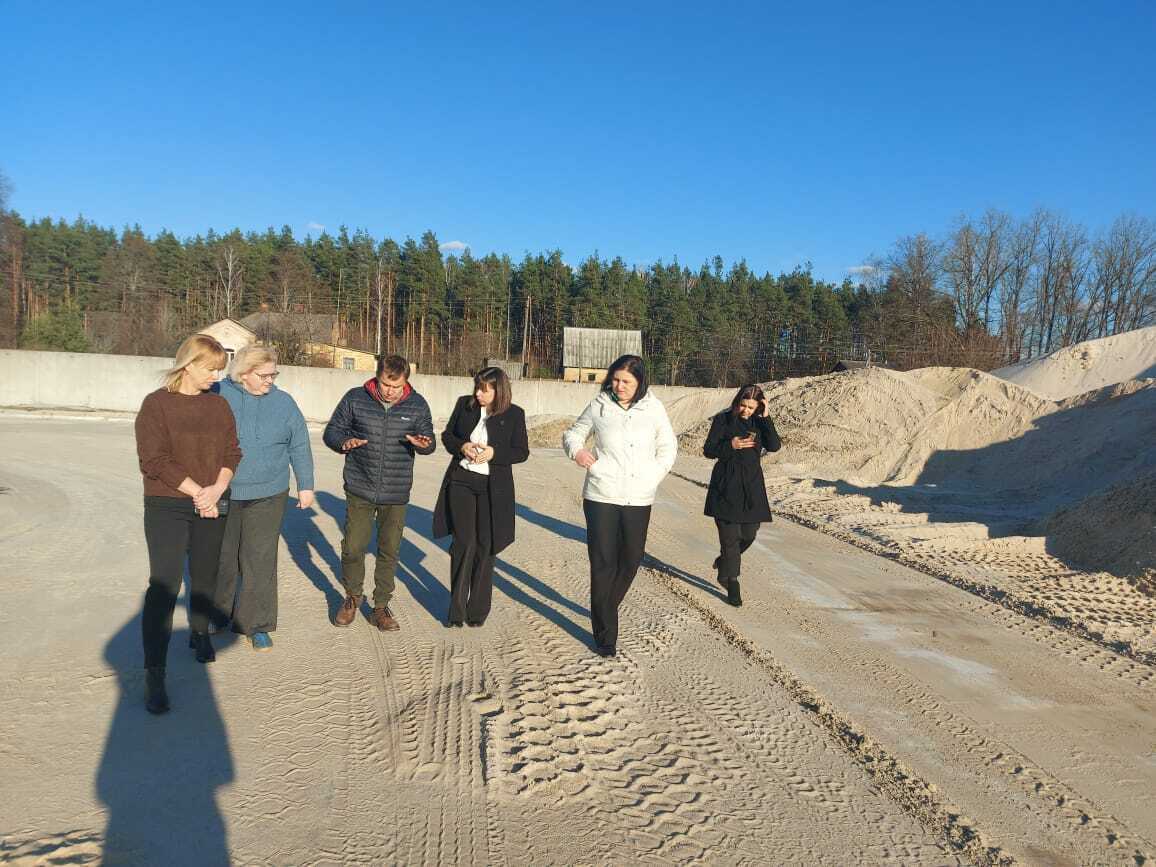
Leaders of the Dobrianka settlement council show one of the most important enterprises for the local budget – Papirnia quarry – to the guests, representatives of the Ivankiv community from Kyiv region
Deforestation is cheaper than mine clearance
What are the community’s assets? What can it use to develop in the future?
Our main resource is land. We plan to use it to give the community a new life after the hostilities end. We have already purchased some software programmes that allow us, on the one hand, to keep a thorough record of our land, and, on the other hand, to have full access to a large database of information about our land resources that has already been registered. We are very pleased with this software package. This audit has already resulted in offers from various agricultural enterprises to lease our vacant plots. The farmers, by the way, thought that it would be cheaper for them to clear our arable land, which was partly covered with forest because it was no longer needed, than to clear the fields in the east of the country, which some of them had cultivated before the full-scale invasion. Such proposals open up new opportunities for us to develop.
Why did the land plots become unwanted? What is the community doing to get them into good hands?
The owners of these plots are often people who have long since left us, but before that, they had exercised their right to 2 hectares of their own land because they had maintained their residence in our community. It is very difficult to find them now, but this is part of our work. We also systematically work on the conclusion of lease agreements and involve the tax office in this process. Recently, we have held a public hearing, and I asked everyone to check whether they have any land tax arrears. We have also received more than 1,000 hectares of reserve land as part of the decentralisation reform. We are now trying to change the intended use of several large plots. If we succeed, we will have a good offer for farmers at land auctions. I would like all our land to be under cultivation and in order, and for our people to have an income from their plots of land. Then the settlement council will have more benefits and fewer problems. Besides, the fires we have suffered in recent years will be less if the land is cultivated.
One of the typical plots of land ‘no one needs’ in the Dobrianka community, covered with forest
Mobile medical teams – a good solution for a large community
Are the services in the community being provided in the same way as they were before the full-scale invasion?
I have already mentioned educational services: children study in a mixed mode. As for medical services… We have only primary healthcare: an outpatient clinic and primary healthcare centres. However, given the size of our community, many people living in remote villages have difficulty accessing health services. These problems are partly solved by the ambulance, which is based in Dobrianka, but still, the ambulance has other functions. I see the solution to this problem in the creation of mobile medical teams and laboratories at regional or district level. Our community would be happy to participate in and co-fund such programmes. After all, mobility is now practised in many areas: mobile administrative service centres, mobile pharmacies, mobile medical buses with some types of medical specialists who visit patients several times a year are operating in different communities.
Are there no similar programmes in the Chernihiv region?
They do exist, and we are already taking part in them. For example, teams of doctors visit our community as part of a health screening programme for teachers. Only the week before last, our community signed a memorandum of cooperation with the Centre for Disease Control and Prevention of Chernihiv Region and the Chernihiv Cancer Centre, and the first trip of a large group of our women over 45 to Chernihiv has recently been made. Now we are preparing the next group. A bus with different specialists also came to our outpatient clinic to treat our residents. As for the organisation of the medical sector, I would also like to mention that some of our starostas cooperate with the Red Cross, which sends us both its doctors and free medicines.
Signing of an agreement between the Dobrianka community, Centre for Disease Control and Prevention of Chernihiv Region and the Chernihiv Cancer Centre. Svitlana Bytsko, standing on the right
Do you think it would be worth looking abroad for funding to transport mobile medical teams?
True, but where are we going to get doctors for these teams? We have two general practitioners. Both have reached retirement age. Only the region or district can provide specialists! By the way, we have had a long history of co-operation with international donor agencies in other areas. For example, we worked with USAID on our development strategy. This is a complex and lengthy document, and it would be difficult for us to complete it alone. Fortunately, we completed most work before USAID closed. We have also repeatedly received various forms of support from UNICEF and other organisations. For example, the ‘For a Strong Ukraine’ charity fund provided us with an air raid warning system. We could not have done this on our own.
How are you searching for international assistance? Do you write and submit projects?
When we approach an international organisation, the first response is: ‘Great! Let’s cooperate! We will come to you next week!’ But when they look at the map, they apologise: ‘You are right on the border! It is not so easy to get to you!’ And they never come. The staff of international organisations often do not even have the right to visit us because of their own security protocols. As for writing projects, we are still learning. We do not currently have a person who can do it well. We feel this problem very keenly because we set ambitious goals, but we often get physically exhausted because we are unable to achieve them. Especially when it comes to capital investment and capital construction.
What kind of capital construction do you mean?
For example, building shelters took a lot of time and effort. And it is much more difficult for us when the law enforcement system interferes in this process. And it keeps interrupting. So you start to think that you are doing everything wrong, that you are some kind of delinquent, and if so, what is the point of doing anything? After all, you will always be guilty. On the other hand, there are a lot of other regulatory authorities supervising us. And they always want something from us, which often makes us feel like we are between a rock and a hard place. It is very exhausting, and we often have no time for projects. Unfortunately, we amalgamated quite late and only switched to direct interbudgetary relations with the national government in 2021. That is, that year was the starting year for us, and all our attention was focused on creating the institutional structures of the community, on rationalising the spheres of education, culture and medicine. We just did not have the time to search for donor funds. And then the full-scale war broke out…
Working on the Dobrianka community strategy
‘Shoulder to Shoulder’ with the communities at the rear
Does your community take part in the ‘Shoulder to Shoulder: Cohesive Communities’ National Project of the Ministry for Development?
We are just familiarising ourselves with this project. We know that several communities from our region are already involved. The consolidation of rear and border communities is a very positive initiative. We really hope that our partner community will help us with international cooperation. We desperately need friends from the rear regions to help us survive these difficult times. We need professional advice on writing projects, we need specialists. If our partner community could help us to join the international projects in which it is already involved, we would be very happy.
Do you have partnerships with communities in the EU, USA and other regions of the world?
We signed a cooperation agreement with only one Polish gmina two years ago. Unfortunately, there were elections there after that, and the people who came to power were not very interested in co-operation with us. Therefore, all our appeals to this gmina have remained unanswered. Meanwhile, we really need such cooperation, and we are always looking for it, but it is becoming increasingly difficult to find partners abroad. I sometimes attend various international events, including those organised by the Women’s Congress, of which I am a member. In response to proposals to do something together, we often hear refusals or a few formal phrases that lead nowhere. Last summer in Poland, I asked if local communities were building shelters and offered to share our experience in this area. However, it turned out that no one was interested in building shelters or civil protection in general. So, our military experience was not much in demand. And in such a case, it is not cooperation, it is begging.
In your opinion, what are the prospects for the development of the local economy in communities like yours?
If our territories are tax-free after the war, businesses will come and people will return. Without this, we will not be competitive with other communities in Ukraine. This approach is also beneficial for the state, because effective border protection requires people to live close to the border. I believe in our people and our community. I always say: ‘Let’s be optimistic – the world is built on optimists!’ I know that our community has a future because the forests, the land and the border crossing point will not let it disappear.
Svitlana Bytsko (fourth from left) at last year’s International Women’s Congress in Poland
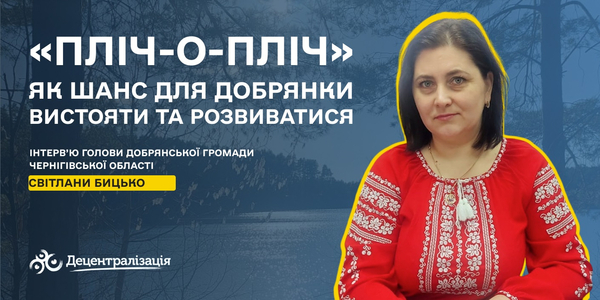
Tags:
war stories side by side report
Область:
Чернігівська областьГромади:
Добрянська територіальна громадаSource:
Decentralization portal

23 January 2026
Employment services closer to community...
The Cabinet of Ministers of Ukraine has adopted a resolution that directly strengthens the capacity of communities in...
23 January 2026
Стартував відбір на Резиденцію ідей «Культурна спільнодія»
Стартував відбір на Резиденцію ідей «Культурна...
Пізнайте, як культура працює з досвідом війни, пам’яттю та відновленням спільнот – як формується взаємодія між...
22 January 2026
Громади отримають черговий пакет фінансування на 119 проєктів відновлення за підтримки ЄІБ
Громади отримають черговий пакет фінансування...
Громади отримають 740,3 млн грн, для реалізації 119 проєктів відновлення у громадах, за підтримки Європейського...
22 January 2026
Стартував відбір громад до другої черги проєкту «Рух без бар’єрів»
Стартував відбір громад до другої черги проєкту...
Міністерство розвитку громад та територій України розпочинає прийом пропозицій від громад для участі другій черзі...
